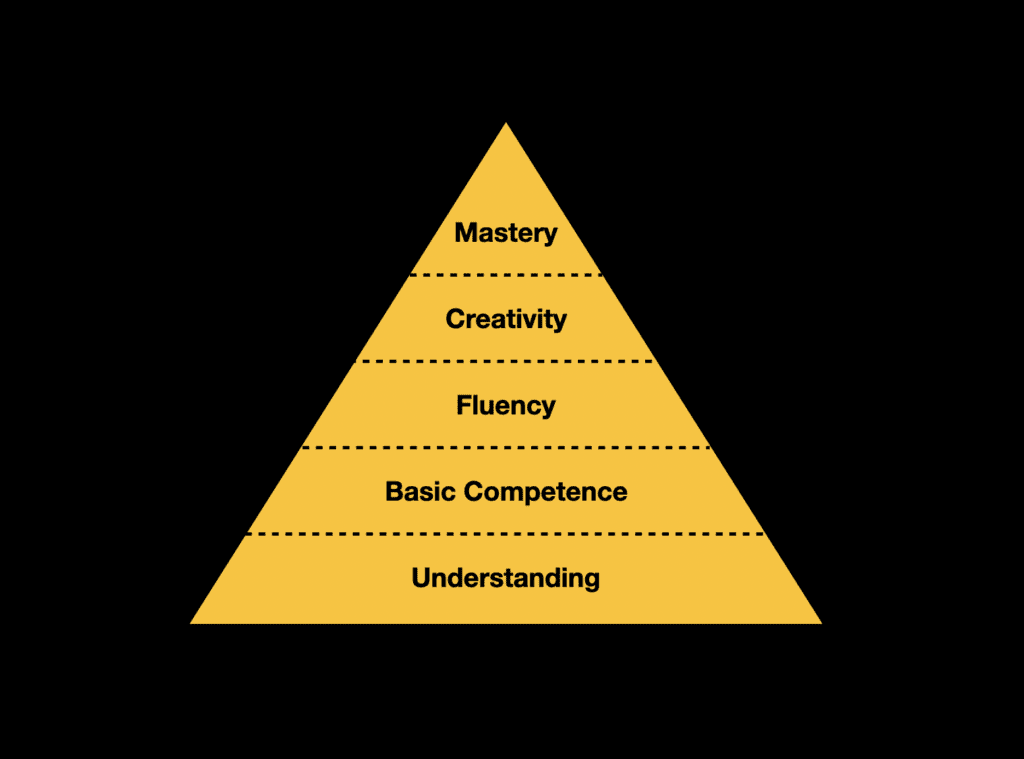
THE FIVE LEVELS OF MASTERY (AND HOW GOOD IS GOOD ENOUGH?)
No matter what skill or topic you are learning, progress happens in stages. Bryan walks through his Five Levels of Mastery, what it takes to get to each level, and offers some counter-intuitive ideas about how far you should take your skills.

In our last post we covered the concept of developing a “Skills Network” and the importance of Multiplier Skills.
We need to create high value experiences and develop high value skills. We then we need to tie those together to create a “Skills Network.”
The idea behind a skills network is that mastery is not the only way to be successful. Being the best in the world—or even among the best in the world—is worth pursuing if you have that combination of talent, desire and circumstance to pursue it. I don’t discourage this at all. When you are truly the best, you can reap most of the rewards.
But there’s another path that is open to all of us, and that is to be the only one with our unique combination of skills. You don’t have to be the best if you are the only.
Developing a strong, unique skills network opens up more doors, helps overcome more obstacles, and sets us up for greater success.
But how do we decide which skills to develop, and how far to take them?
It’s first worth reviewing just what it means to develop a skill.
THE FIVE LEVELS OF MASTERY
As we learn or improve in any subject, we have to go through stages. These stages can take more or less time depending on the difficulty and complexity of the area we are studying. Here’s an outline of the basic stages:
LEVEL 1: UNDERSTANDING
You know a little about the field, it’s connection to other fields, maybe some of the key players and their unique roles. You don’t know enough to do anything or to have an informed opinion, but you are aware of what others do or think.
LEVEL 2: BASIC COMPETENCE
You have a solid understanding of the key concepts. You could explain it to someone else to teach them the gist of it. If it is a skill, then you can do most of what you need to do, albeit slowly and inefficiently. You may need to refer to manuals or mentors for difficult tasks, yet you can get most jobs done.
LEVEL 3: FLUENCY
This is the level of a typical professional. If it is a school subject, this might be someone who majored or even mastered in the field. In a company, it’s a standard employee who makes a living doing this skill. You know all of the key aspects of your job and you can execute them efficiently and without assistance.
LEVEL 4: CREATIVITY
This is one step above being a professional. It is a professional with a specialty or unique ability that sets them apart from the average person at level 3. This might be a professor who has done unique research in their field, an athlete who brings a unique approach to their sport, or an employee who is able to produce results that others are not.
LEVEL 5: MASTERY
This is the final level and it involves understanding your field, craft, or skill so well that there is virtually nothing you can’t do. You understand the connections between your work and everything it touches. You are able to solve new and unique problems that others cannot. You are often not only dominating your field, but inventing where it will go in the future.
Obviously, it’s better to be at a higher level than a lower one. But it’s not as straightforward as that, because each level gets progressively harder to attain.

THE 10X RULE
I view each level as requiring approximately 10x more time to attain. If you can get to Understanding in 10 hours then you can reach
-
Basic Competence in 100 hours
-
Fluency in 1,000 hours
-
Creativity in 10,000 hours, and
-
Mastery in 100,000 hours.
That leap from Creativity to Mastery is probably a bit extreme. But true mastery is often a lifetime pursuit. Or a lifetime’s worth of focused effort.
The numbers aren’t so important, though. The important insight is that every level requires increasingly longer and more difficult commitments. Knowing where you are and how long it took you to get there can give you some insight into how long it will take to reach the next level. On top of that, when you commit to get from one stage to the next you should have some expectation of benefit at the end.
Fortunately, there is often a 10x function to your returns as well. In many fields, the best of the best earn exponentially more than the average professional at Level 3.. If you are in a field with that type of dynamic, then pursuing mastery can certainly pay off.
But if you end up being the 20th best or 100th best, you may find that despite all your efforts you will not get the benefits. There’s a risk and reward to investing that much time.
Like all of us, I admire greatly anyone who achieves the pinnacle of their field. But it is important to remember that being the best in an existing field is just one way to achieve success. The other is through being unique and carving your own path.
HOW GOOD IS GOOD ENOUGH?
This is the million dollar question. How good is good enough? At what point does it make sense to stop developing in one area and focus on something else?
The truth is, there is no right answer. But there are options. I like to think of athletes when I give this example because in sports the measure of success is so clearly defined. You either win or you don’t, you score or you don’t, you get signed or you don’t.
Take running. The top ten runners in the world might make more money from sponsors and prize winnings than all other runners combined. If you are the 100th best runner, you might not be able to make a decent living running. And that’s despite being one of the fastest people in the world.
But what if you’ve developed other skills that are complementary to running. What if you mastered social media, video production, or writing? What if you knew how to code or design and used that to develop something unique to you? What if you were able to coach others?
All of these skills, combined with your running ability, would allow you to carve out a unique niche independent of your race results. And this could be quite lucrative.
I have an acquaintance who was an elite triple jumper. He dove into social media and built such a following that he now makes more for one sponsored post than most triple jumpers make in a year. And he was still able to compete while doing this.
More often than not, it’s your combination of skills that will set you apart.
You don’t have to achieve mastery in any one skill to do it. You usually only need to get to somewhere near Fluency in a few strategic areas. And Fluency is absolutely achievable for just about anyone.
Even if we assume 1,000 hours to achieve Fluency, that is maybe year’s worth of work. With the right coach and approach to learning, it can be even faster. And you’ll start to see the dividends far before that.
When you strategically develop skills that complement each other, you will slowly open more and more doors, and create more and more opportunities for success.
Pursuing mastery is an option. In fact, if you are truly passionate about something you should strive to master it. But do that for yourself, not as your sole strategy for success.
While you master your passion, don’t forget to develop your Skills Network. That will be what truly sets you apart.

BRYAN GREEN
Bryan Green is the co-founder of Go Be More and the author of Make the Leap: Think Better, Train Better, Run Faster. The book helps aspiring runners experience rapid improvements by generating powerful leap cycles. His companion workbook is designed to apply the principles in daily training, and his coach’s guide provides activities for teams to do together. He also publishes the rapidly growing Think Better Newsletter every week. Learn more at maketheleapbook.com or purchase your copy of his book directly below.


